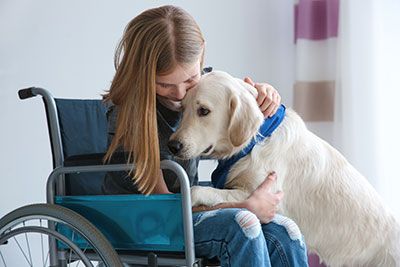After George H.W. Bush became a widower, his service dog Sully helped fill a void in the life of the former president and assisted him with daily activities. Service dogs and family pets provide beneficial physical and emotional support. Pet owners can return the favor by making plans for the care and welfare of their special friends if they'll have to spend the future without them.
Few will forget the iconic image of Sully the service dog lying at the casket of his best friend, former President George H.W. Bush.
The 2-year-old yellow Labrador was a loyal companion and trusty assistant during the last several months of President Bush's life, and the beloved pooch helped fill a void after first lady Barbara Bush died in April 2018.
Following in his friend's footsteps, Sully will continue in his own lifelong mission of service as an active member of America's VetDogs, spending time with and assisting patients at Walter Reed National Military Medical Center near Washington, D.C.
Service and therapy pets are well-known for the emotional support, physical assistance and potential health benefits they provide. In the case of the 41st president, who had a form of Parkinson's disease that required his use of a wheelchair, Sully was able to open doors, fetch things and summon help if needed.
Social interactions among people, especially for older folks, are good medicine for loneliness and provide mental stimulation, says a Psychology Today report on the pet-human bond.

But animals may have a leg up on the average Joe in the good vibes they give to others.
“Humans are judgmental, and when you're sick, stressed or just trying to process life, pets won't judge you, and they will be there for you unconditionally,” the report says. “Often times, the presence of a fellow human, even if it's a friend, would contribute to our stress, even if that is not our friend's intention. … We can say that pets provide a safe place for people, and during illness or emotional struggle, this can be very helpful in the process of recovery.”
If you need some quick video evidence, watch what happens when YouTube sensations Ross Smith and 92-year-old “Granny” show up for a Thanksgiving visit at an assisted living center with a small herd of puppies. The residents, mostly elderly Alzheimer's patients, were awash in love and serenity as they cuddled with their furry, therapeutic companions.
Experts say that wagging tails even work physical wonders.
“Researchers have long suggested that pets are good for us, even offering health benefits such as lowering blood pressure and heart rate, reducing the stress hormone cortisol, and boosting levels of the feel-good hormone serotonin,” says the online community Alzheimers.net. “It stands to reason, then, that finding four-legged friends in Alzheimer's and dementia communities is becoming commonplace. In fact, some facilities are hiring pet coordinators to aid in the care of residents' pets.”
Any animal lover understands the special bonds that are formed, and that warm feeling inside means something, according to the Alliance of Therapy Dogs (ATD).
“Physically, the presence of and interaction with therapy animals can help lower blood pressure, reduce the number of medications that people need, diminish overall physical discomfort or pain, motivate people to exercise, and help children with autism in the departments of language and social interaction,” the ATD reports.
Looking for more information on acquiring a service dog? Here is a guide from Bankrate that provides information about locating and affording a service dog.
Are you ready to return the favor?
Many people consider pets as members of their family. Your pets take care of you, and you take care of them. That's a deal a responsible pet owner gladly makes. If you value your pet as much as it unconditionally treasures you, you should be prepared to return the favor to your adorable dependents.
Part of having a comprehensive life and estate plan is being prepared for the unexpected events - illness, incapacity or worse - regardless of one's age or status in life. That requires working with qualified professionals to utilize the appropriate documents that protect your interests, and those typically include powers of attorney for health and finances, wills and trusts, beneficiary designations, living wills and others. Your plans are made to protect your loved ones - and those plans should include pets.
The full range of pet owners, whether they are in robust health or their final years of life, should make provisions for the care and future welfare of their pets as they create their estate plans. Pets are like people in that they can be provided for with the proper planning documents. One popular option is the creation of a pet or animal trust, which is a type of revocable living trust now available in all 50 states.
How do pet trusts work?
As part of a comprehensive estate plan, a pet trust can be structured to ensure the needs of your pets, just like your loved ones, are addressed in the event of your incapacity or death.

A major benefit of a pet trust is that it gives the animal owners peace of mind knowing they can return the favor of a lifetime of loyalty with uninterrupted care for as long as it's needed. In a typical case, a pet owner (the grantor of the trust) designates one or more trustees, successor trustees, caregivers and successor caregivers, according to a planning guide provided by the American Society for the Prevention of Cruelty to Animals (ASPCA). In a typical situation, a trustee manages the trust's finances and ensures its provisions are honored, and the caretaker provides the animal with food, shelter and TLC. The roles of trustee and caretaker can be filled either by organizations or individuals.
The ASCPA suggests the following “homework” for those who intend to establish a pet trust.
- Develop a detailed description of the desired nature of the pet's daily care, its standard of living and information about its health needs, veterinary care as well as its final disposition.
- Determine the amount of funding required to cover the pet's care based on its life expectancy and appropriate standard of living.
- Specify how and when the trustee is to distribute funds to the caregiver.
- Determine the amount of funding required to pay the trustee to administer the trust and compensation for the caregiver and successors.
- Include a requirement that the trustee conduct regular inspections of the pet to ensure the trust's instructions are being followed.
- Decide on a remainder beneficiary of the pet trust in case its funds are not exhausted.
Pet owners can opt to include provisions in their last will and testament with instructions for a pet's care, designate a caretaker and allocate funds. The instructions of a will, however, do not carry the same weight as the continuing obligations assigned to a pet trust's successor trustee. Also, keep in mind that use of a will for ongoing pet care can keep an estate in probate and prolong its final settlement. It also may cause a gap in the pet's care while the court considers a petition to open an estate.
“The integrity and moral commitment of the caregiver will be your only assurance that the pet's care will continue,” the ASCPA advises. “Therefore, choose your primary caregiver and alternate caregiver, wisely.”
For many, a less favorable option may be for your pet to wind up in a pet shelter or with an animal rescue group. But the least favorable option for a doting pet owner and a deserving friend is to have no plan at all.



